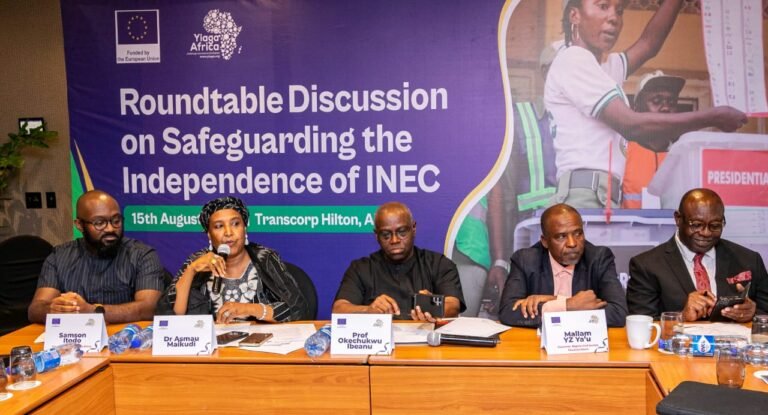Ahead of the 2027 general election, Yiaga Africa has asked President Bola Tinubu to publish the names of potential candidates for the position of chairman of the Independent National Electoral Commission (INEC) and subject them to public scrutiny before screening by the national assembly.
The organisation made the call in Abuja during a recent high-level roundtable discussion in Abuja, organised on ‘Safeguarding the Independence of INEC’.
Civil society leaders and elections experts who attended the event equally expressed their concerns, urging transparent and merit-based appointment process to prevent potential crisis and political uncertainties in the country.
The INEC Chairman, Prof. Mahmood Yakubu, is expected to step down from office later this year, after serving the maximum two terms, of 10 years; while about 10 national commissioners are also expected to retire from the commission before the 2027 elections.
Speaking at the event, Executive Director of Yiaga Africa, Samson Itodo expressed concern that the transition would perhaps make INEC weaker and also impact the quality of the next elections.
According to him, This transition presents a significant threat to the nation’s democratic stability, if not handled with care.
“We have to be worried about the transitions happening in INEC. Because you do require a set of people with the competence to administer a very important component of democracy, which is elections,” Itodo said.
Itodo stressed that a lack of investment in people with experience and knowledge could lead to a significant decline in the quality of the next elections, thus the critical need for President Bola Tinubu to rethink the appointment process for the next INEC chairman and national commissioners.
He also urged a shift from political appointments to a system that prioritises experience, independence, and mental alertness.
Itodo stated: “The president has the power, but before he sends a nomination to the National Assembly, can he publish the list of people he’s considering? Ask citizens, civil society, and professional organisations to submit objections and memos on those people.
“And so, we have said that aside from the constitutional requirements of questionable integrity and non-partisanship, there’s a great need to look for people who have experience in elections or in a related field because elections are a complex technical activity.
“The second point is to look for individuals who are independently minded, individuals who cannot be swayed by any form of political persuasion, individuals who can withstand political pressure because it serves the interest of Nigeria, whether it is the incumbent or even the opposition.
“And for the third part, you need people with mental alertness. The INEC job is very complex and tasking, so you need people who are alert to manage elections. If the next elections are really going to be credible and the perception of integrity is going to be high, it’s going to begin with the appointment process for the next INEC chairman and the national commissioners.
“And so, we are saying that the president has an opportunity, and the national assembly does have an opportunity to do what will inspire public confidence in this electoral process and let them not treat these appointments with any form of executive overreach or political manipulation.”
Also speaking, the Africa Director of the MacArthur Foundation, Dr. Kole Shettima, said that lack of public trust in state institutions, including the judiciary, legislature, and executive, demands a moral high ground from the presidency.
He proposed a televised, national screening of candidates as a way to rebuild public confidence.
“The public at this point feels that the whole institutions of state have been captured,” Shettima said.
On his part, a former INEC Commissioner, Barrister Festus Okoye suggested that the judiciary itself, having been drawn into political disputes, can no longer be trusted to lead the appointment process for electoral officials, a position he previously supported but now believes is no longer tenable.
On his part, Mr Joseph Agama of the Rivers in the Desert Nigeria (RID Nigeria), who represented the Gen-Z at the event said that all the young generations wanted is to be brought into conversations like the Yiaga Africa’s roundtable.
“We know that there is a problem and we don’t know the roots of the problems an even the solutions. Then we are leaning and I have learnt more. I think we should be brought into rooms like this, not necessarily to make contributions. Let us just listen and you would be amazed by the kind of ideas that would come out of us,” Agama said.
For Ms Cynthia, the Yiaga africa’s Director of Programmes, said that the youths and other Nigerians should have their emotional attention to the cause to drive it so that the ‘trending online’ of the campaign can be leverage on.
“Also is to extend this campaign from the national to the state and local government levels. The demand for a public screening process should also be prioritized,” Mbamalu said.

